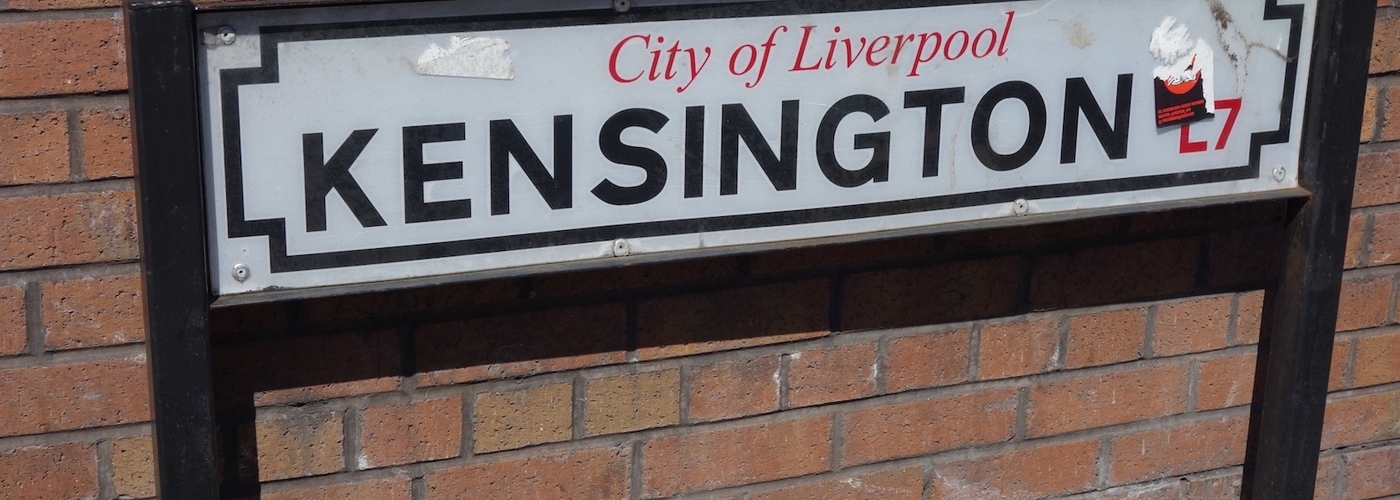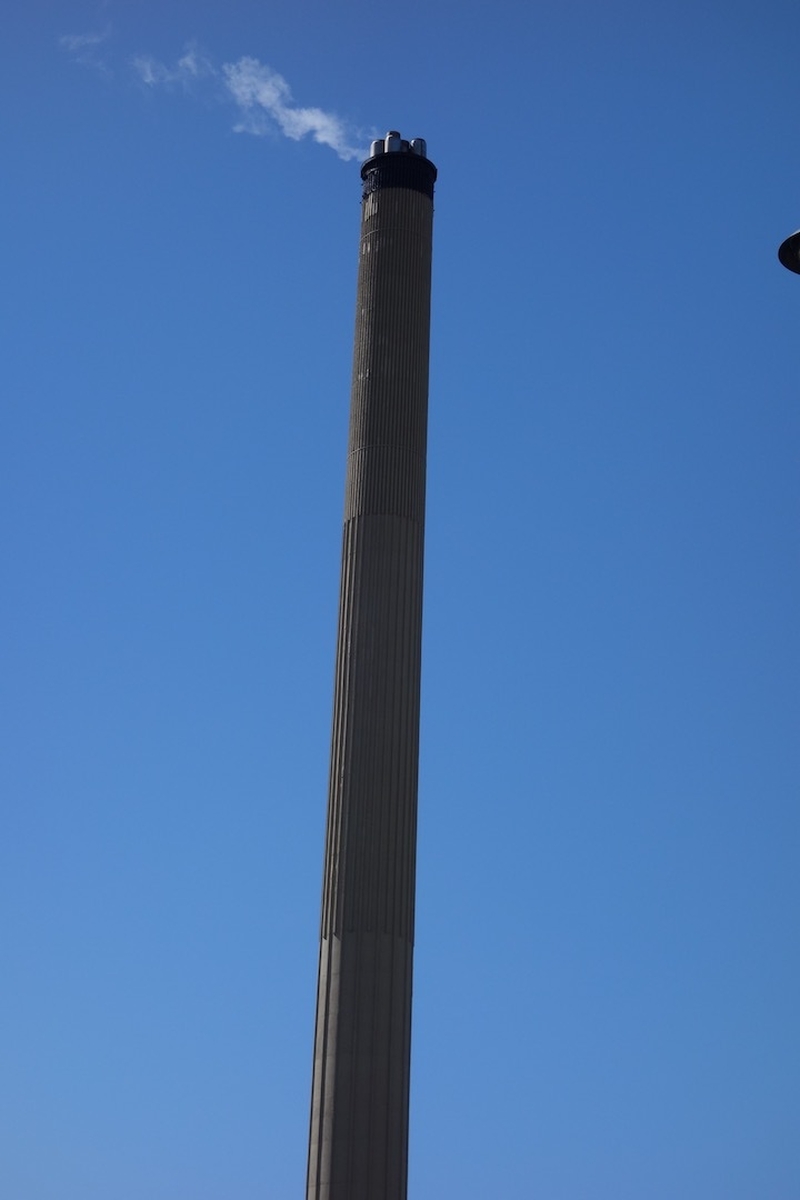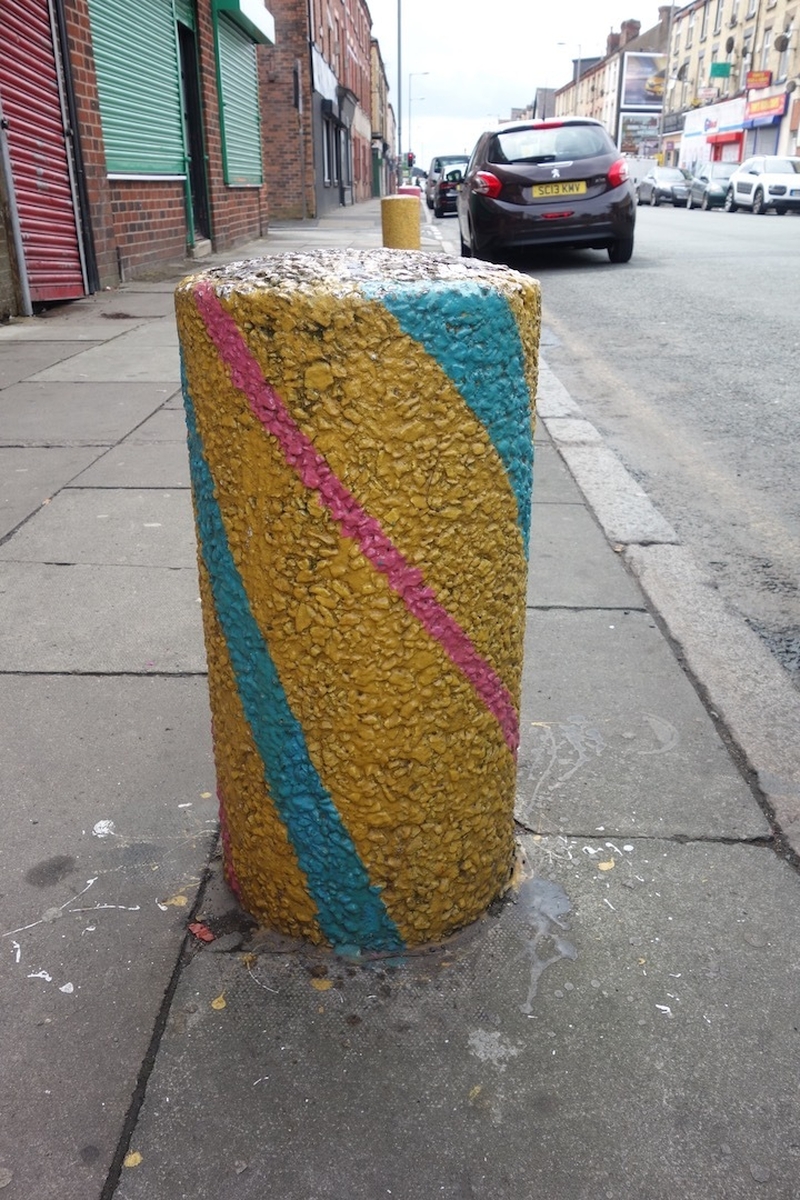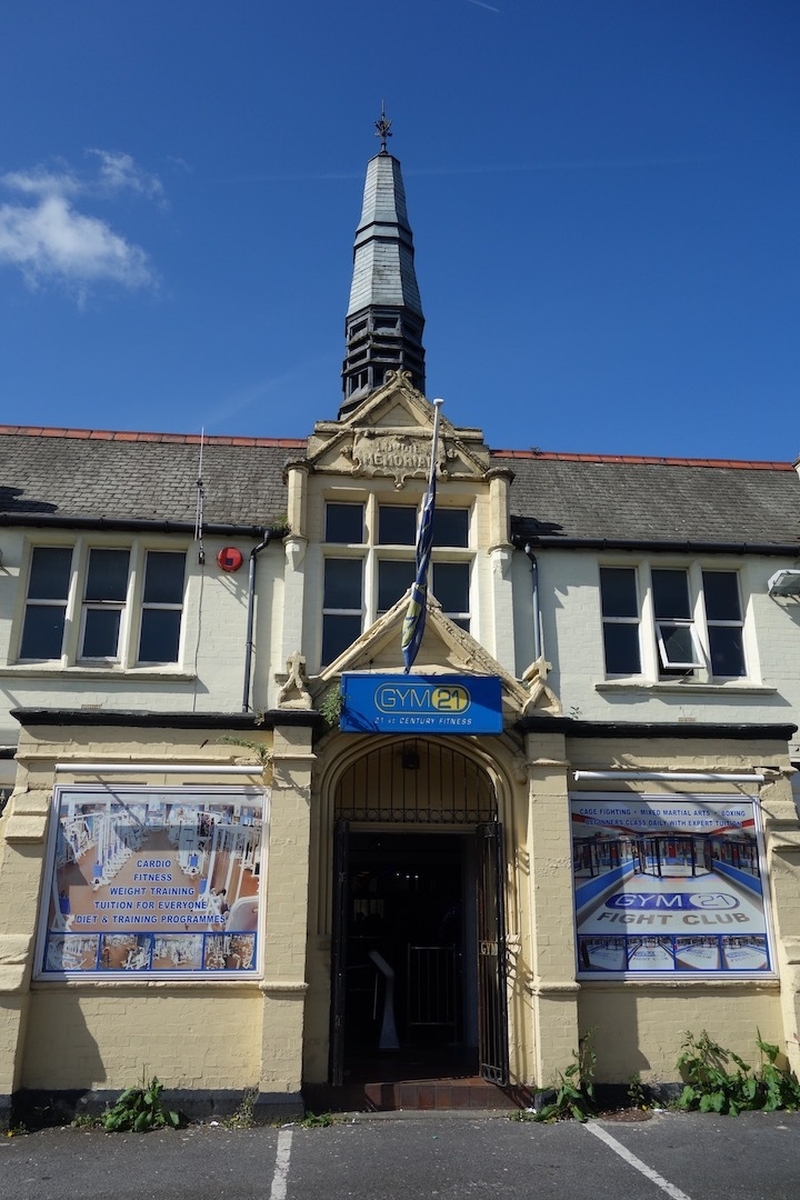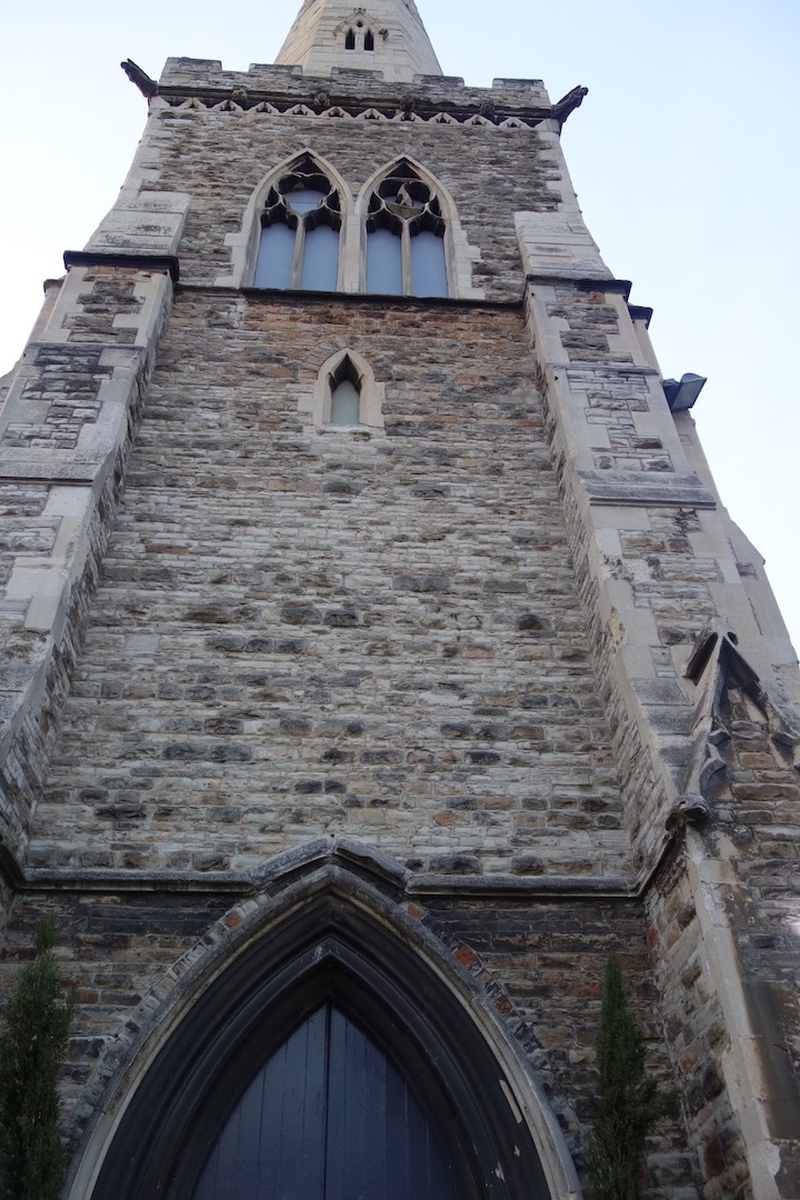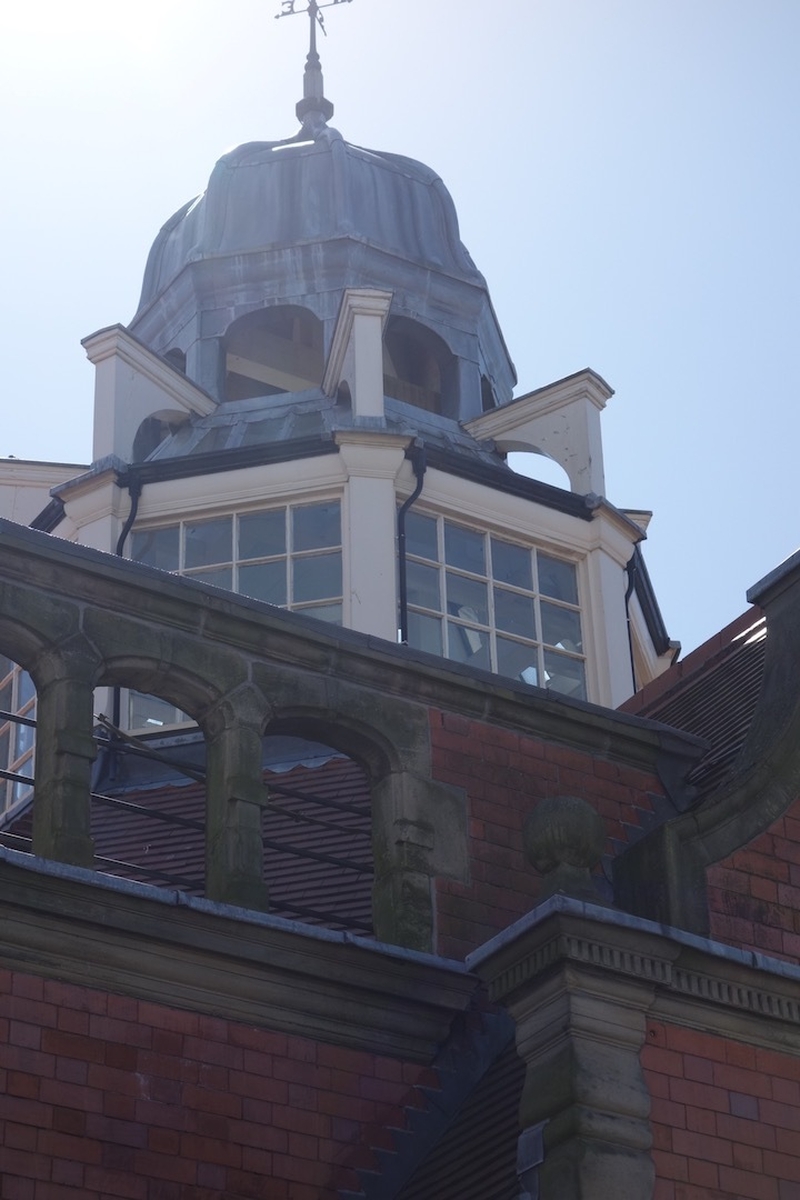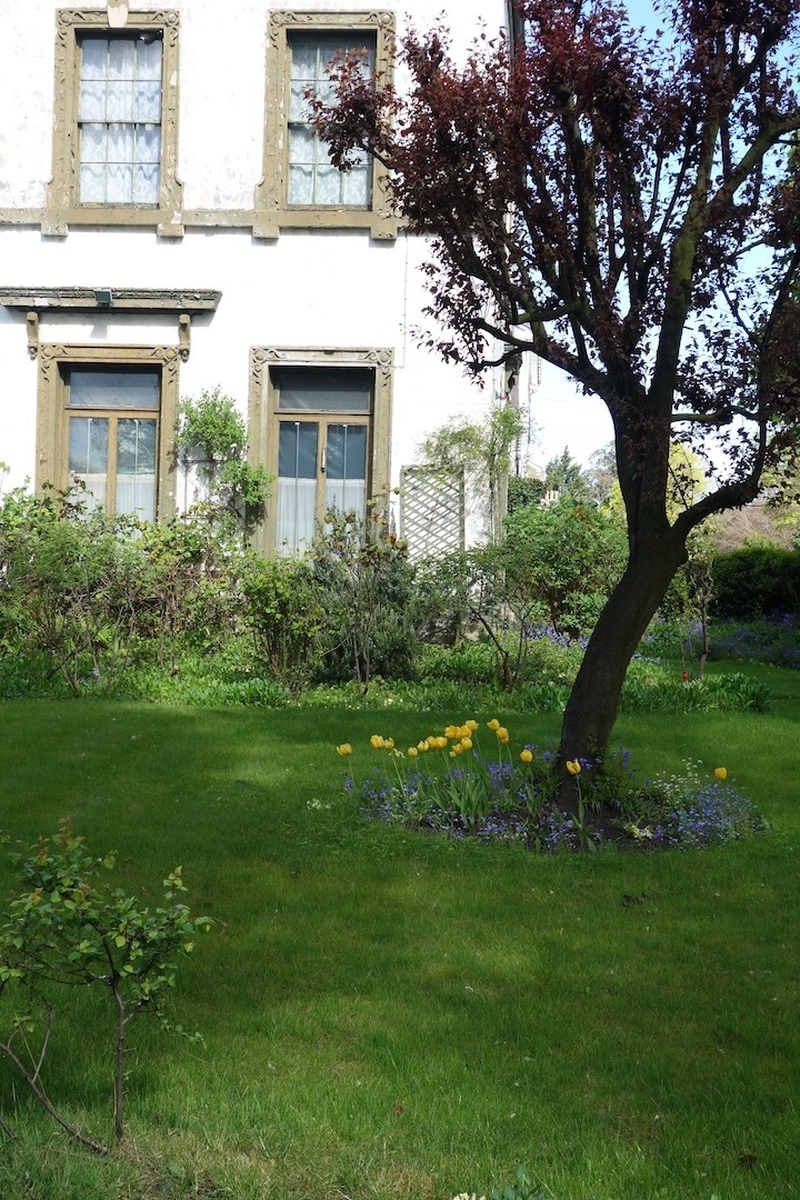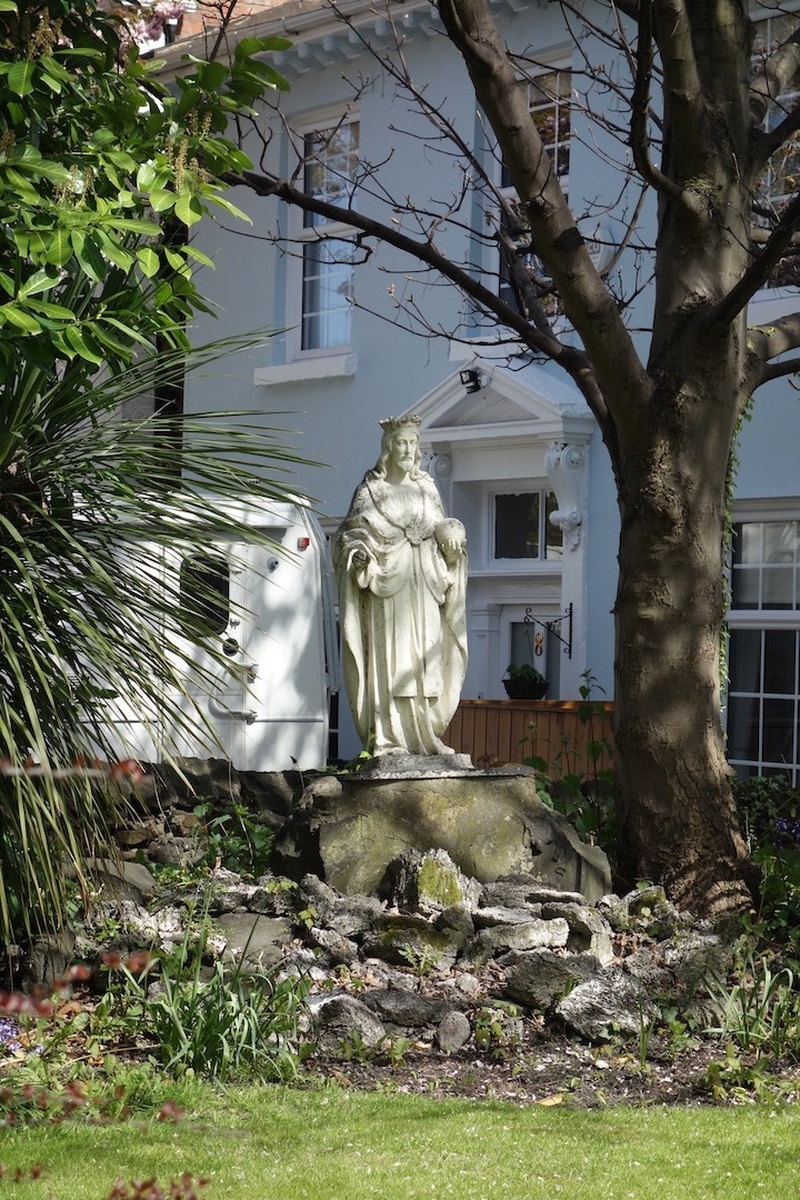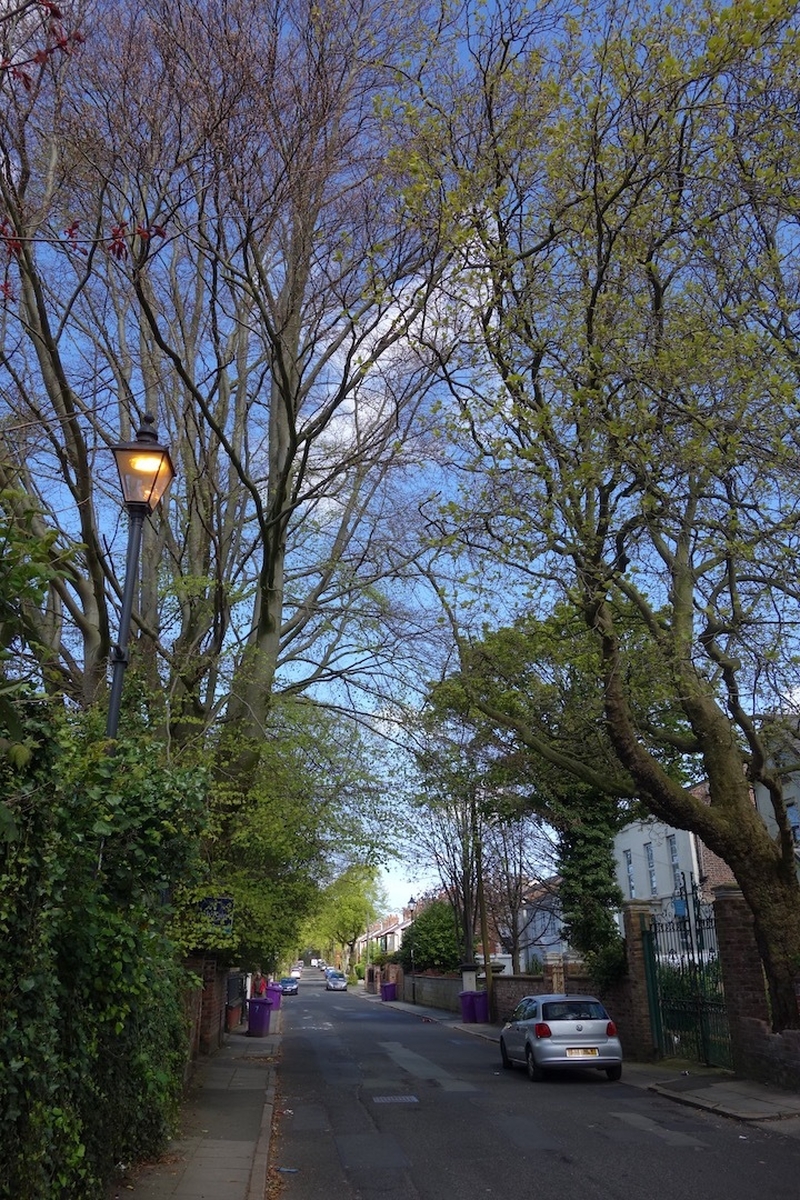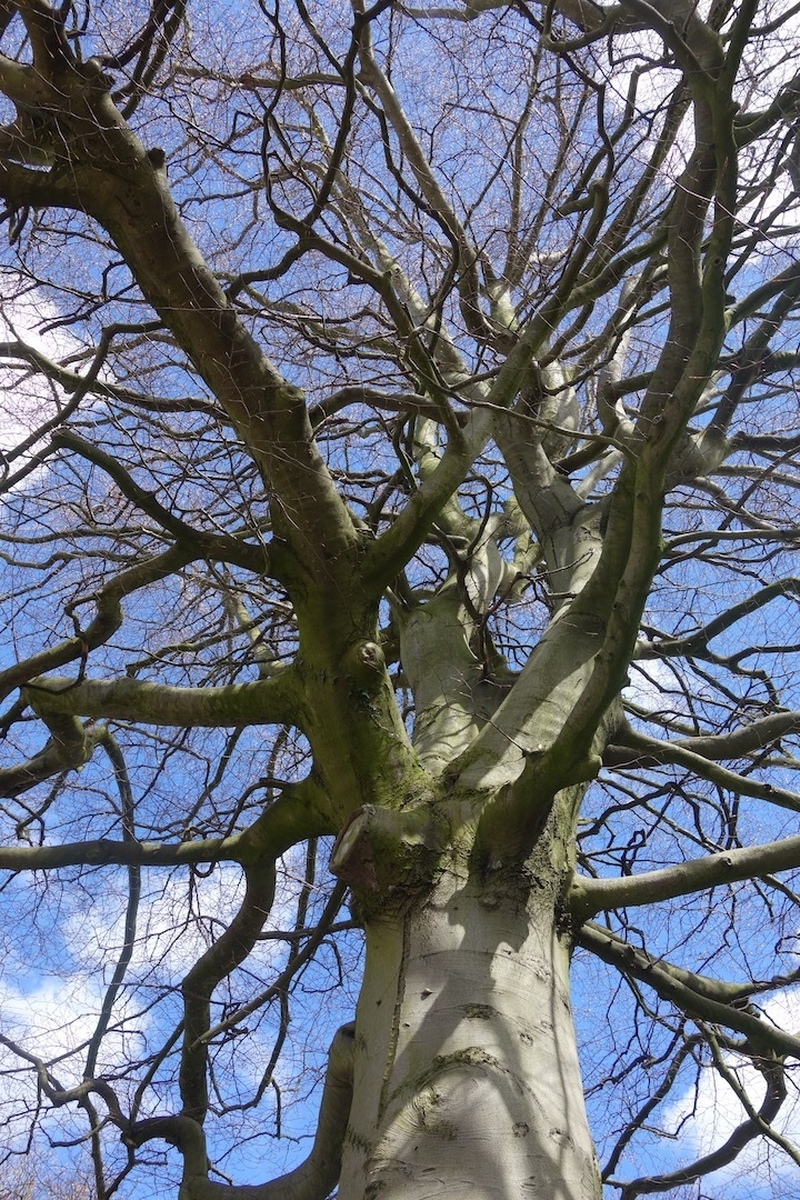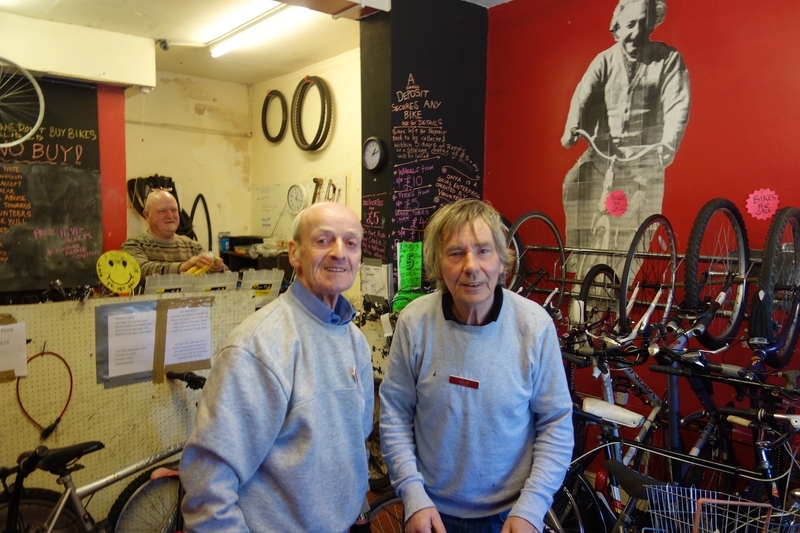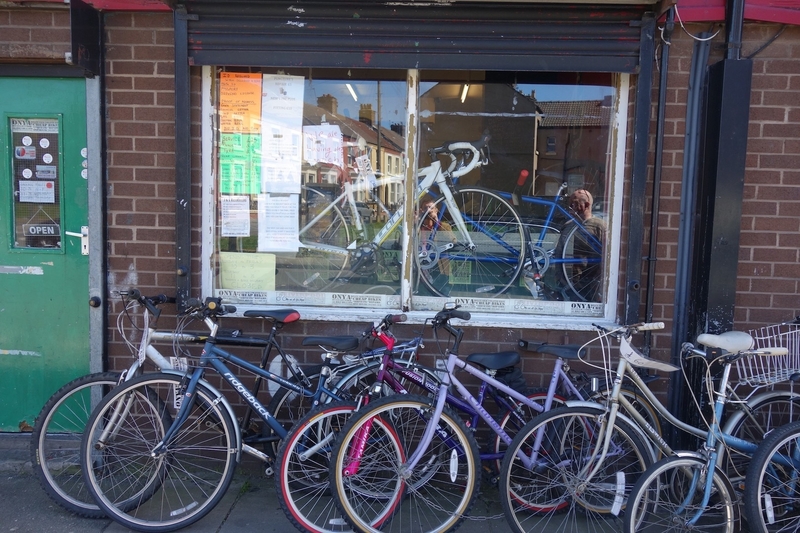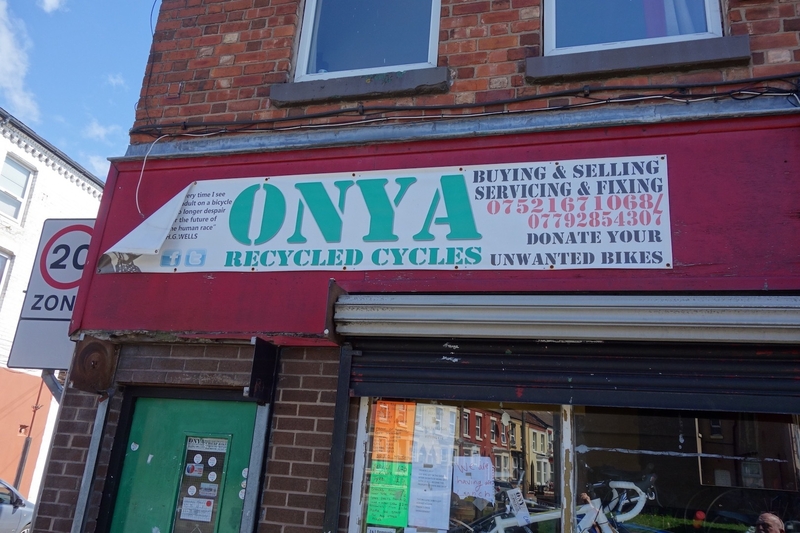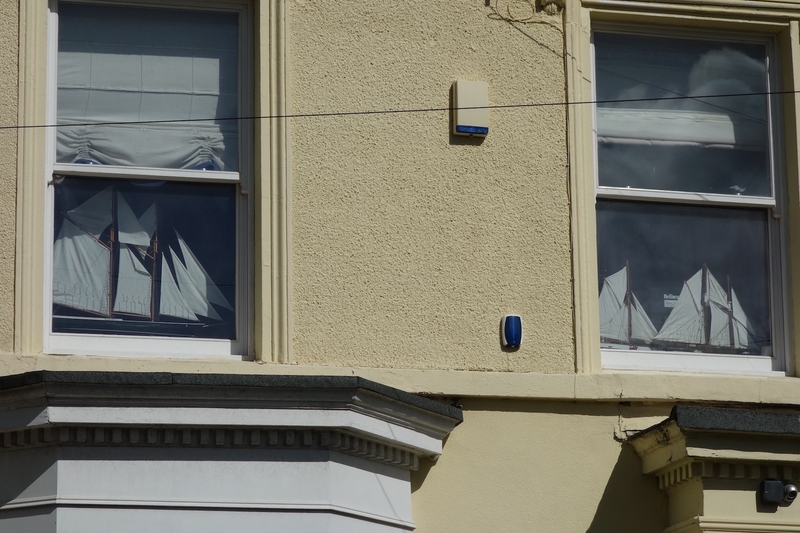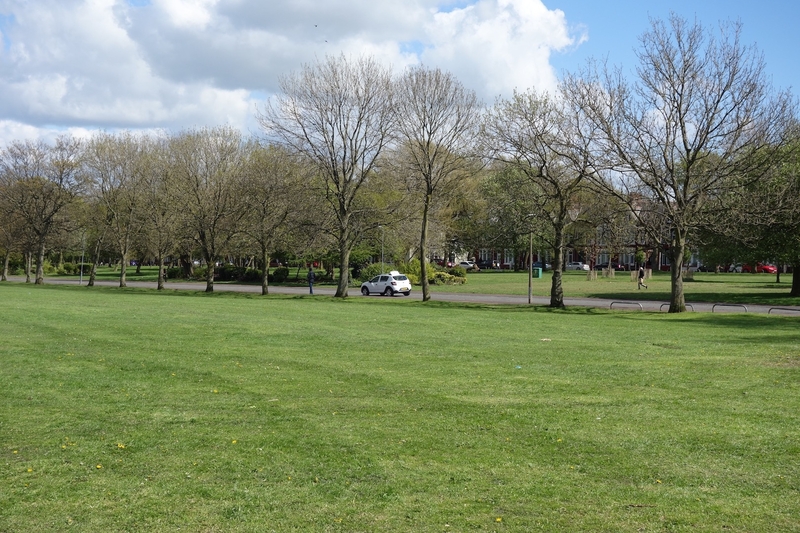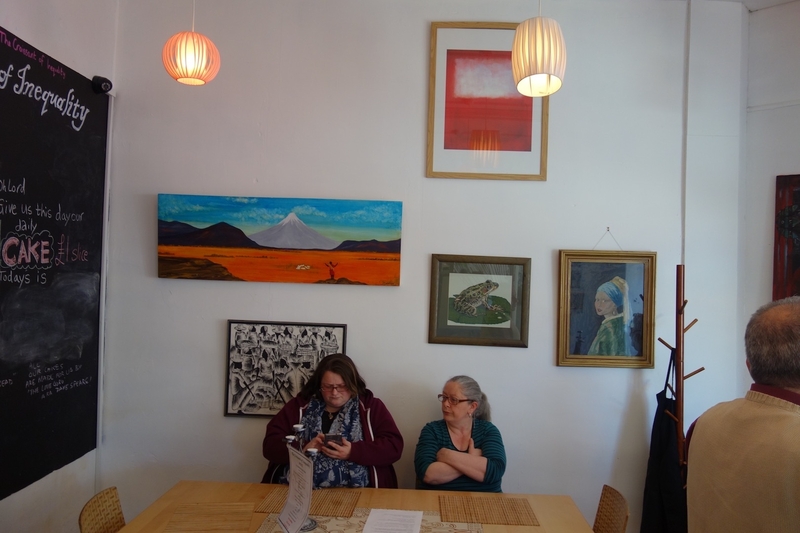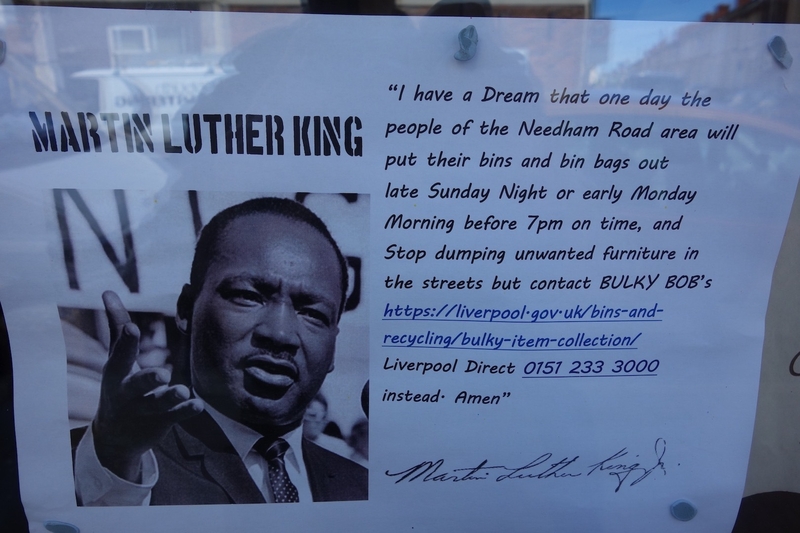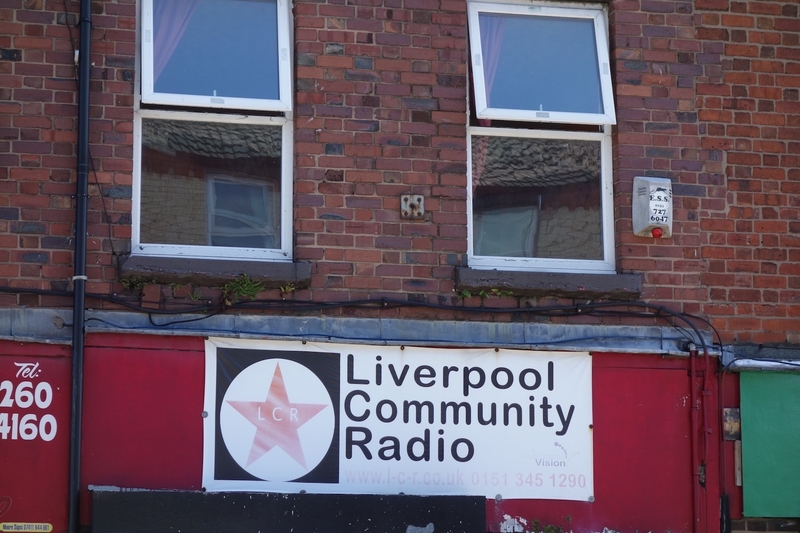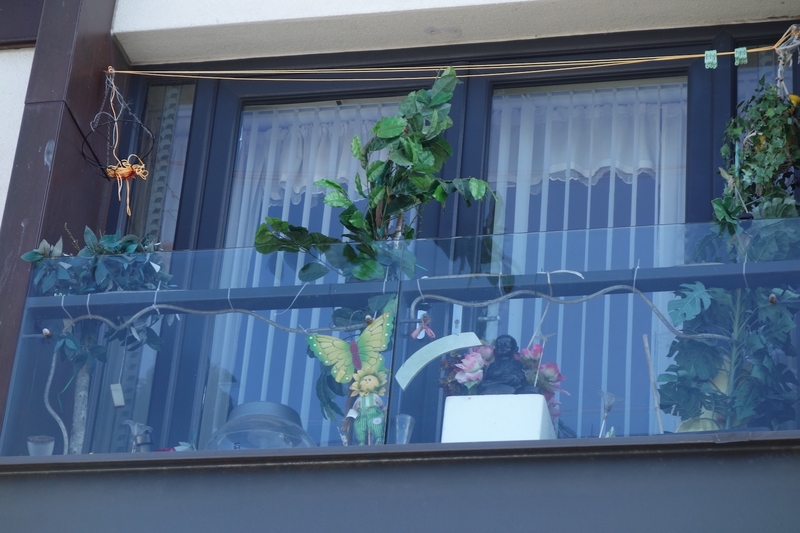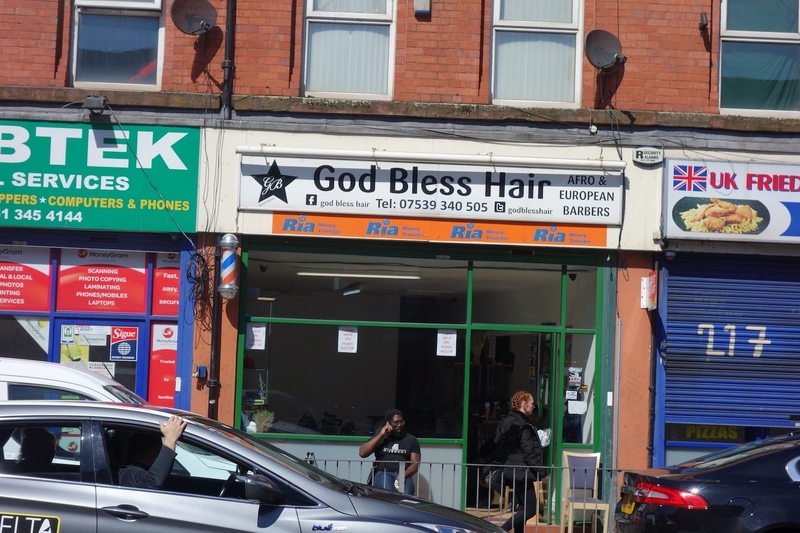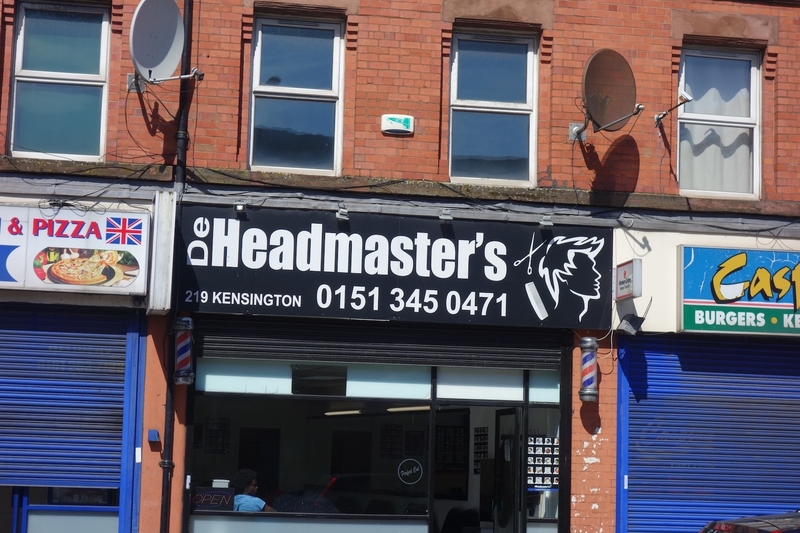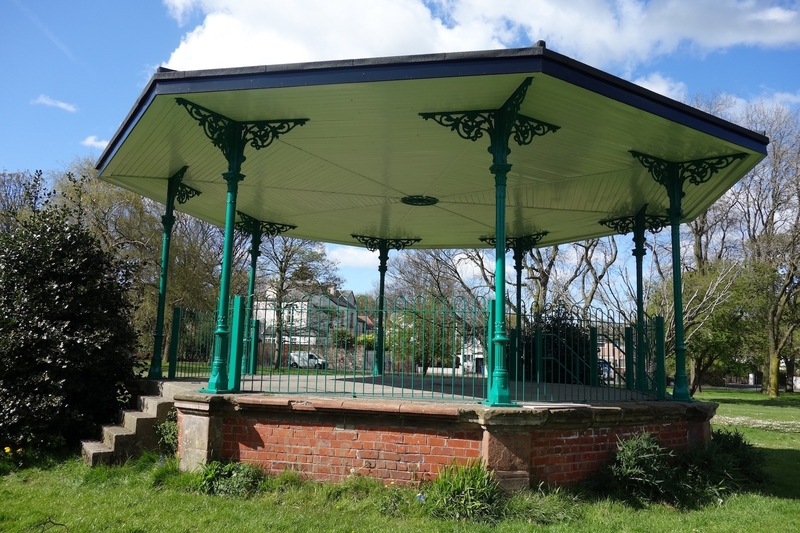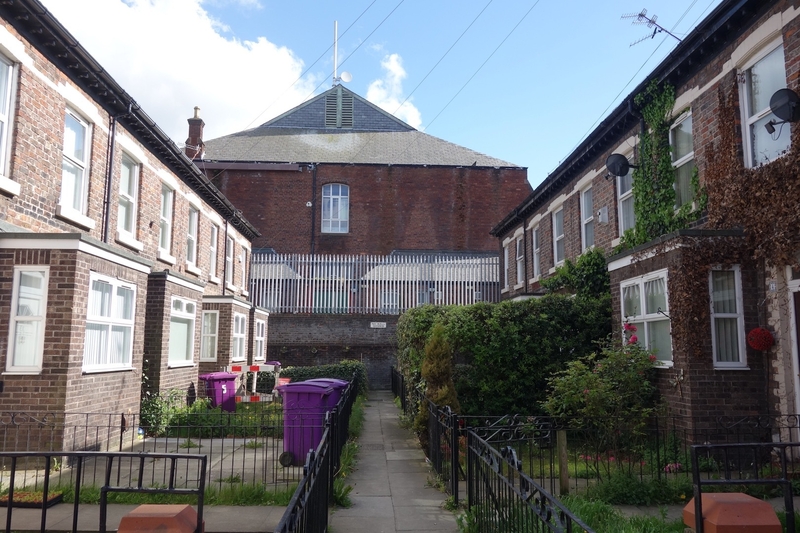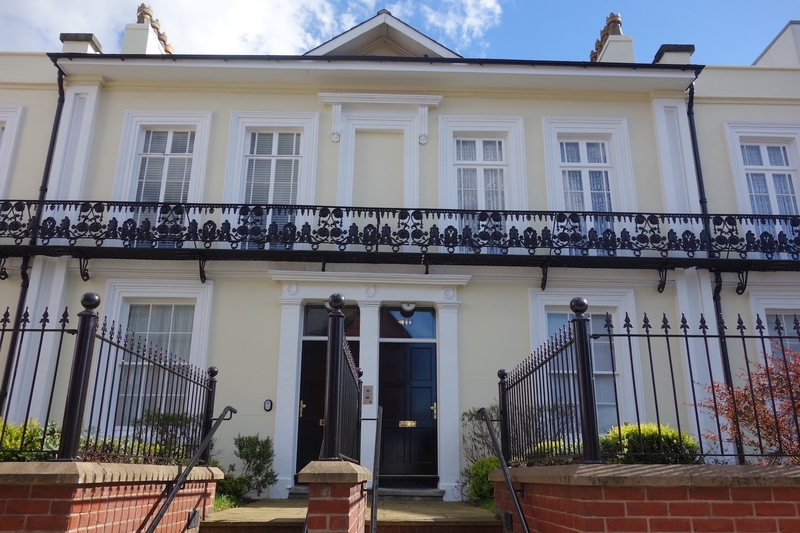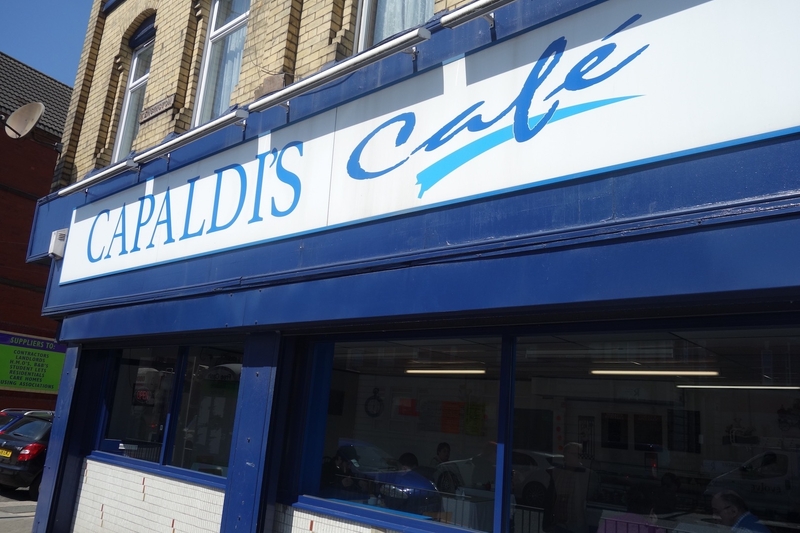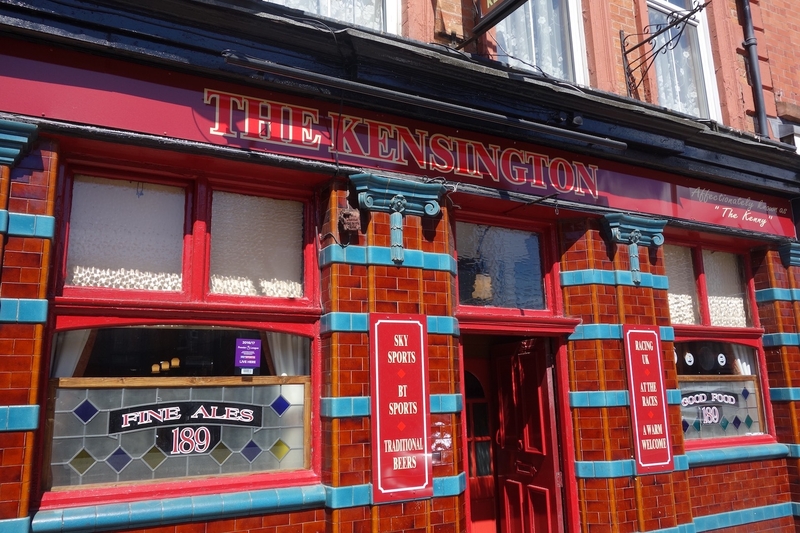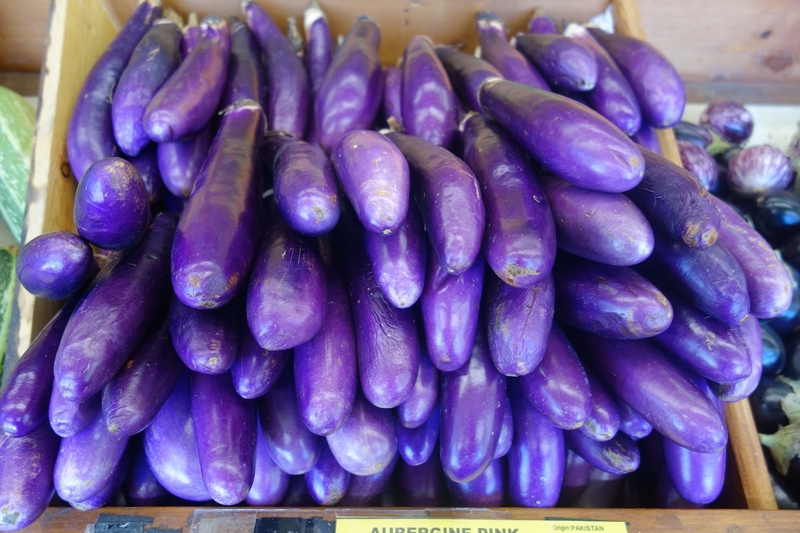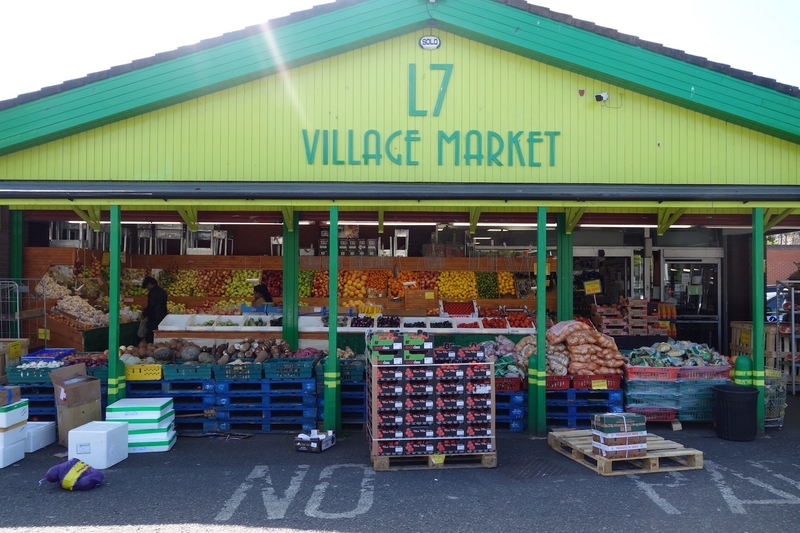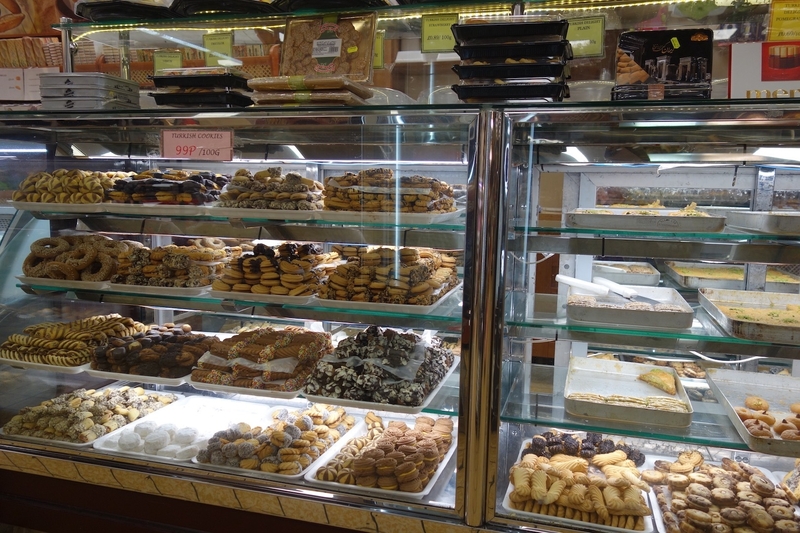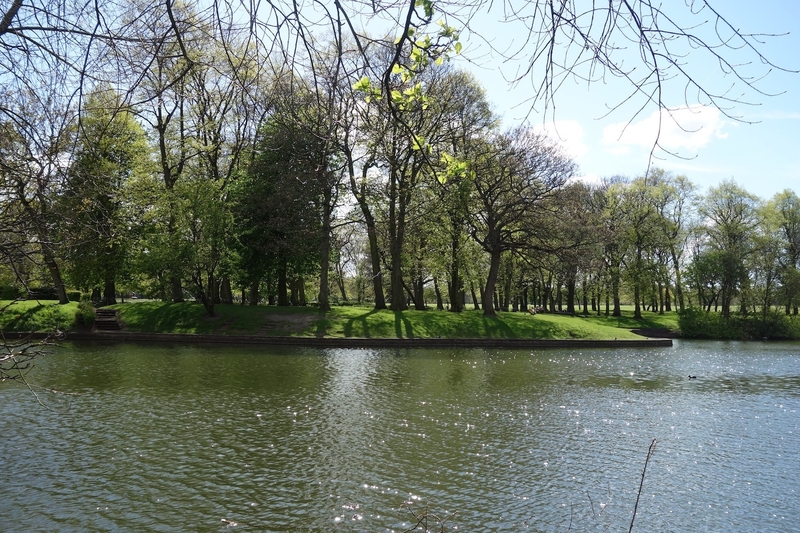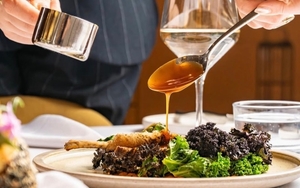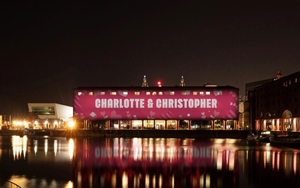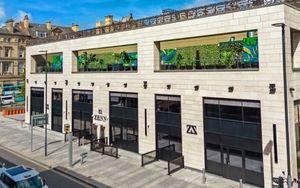Gerry Corner meets and eats with a community unbeaten
AT the Croissant of Inequality cafe, the day’s special is smashed avocado and feta on sourdough toast.
Conversation among customers variously embraces politics, bread-making techniques and natural photons. Close your eyes and you could be out to lunch with Gwyneth Paltrow.
Actually, this is Kensington. Not Kensington, London, home from home of Russian oligarchs, but Liverpool 7, birthplace of a thousand negative cliches.
'Kensington,' says Faragher, 'has been a bit like one of those whales you see beached. The sharks move in, reduce it to a skeleton, then they all fuck off again'
WATCH | The McGann clan do the can-canAt the singularly named Croissant, community campaigner Steve Faragher is acclaiming recent efforts to rid the streets of an unwelcome presence.
To date, 200,000 bags have been given away to dog owners by Kicking the Krap out of Kenny, a campaign whose title was knowingly loaded with ambiguity.
Indeed, the proud and historic ward of Kensington and Fairfield has taken a drubbing of late, courtesy of a local publication and a student unfamiliar with how relations between a guest and her hosts are normally conducted.
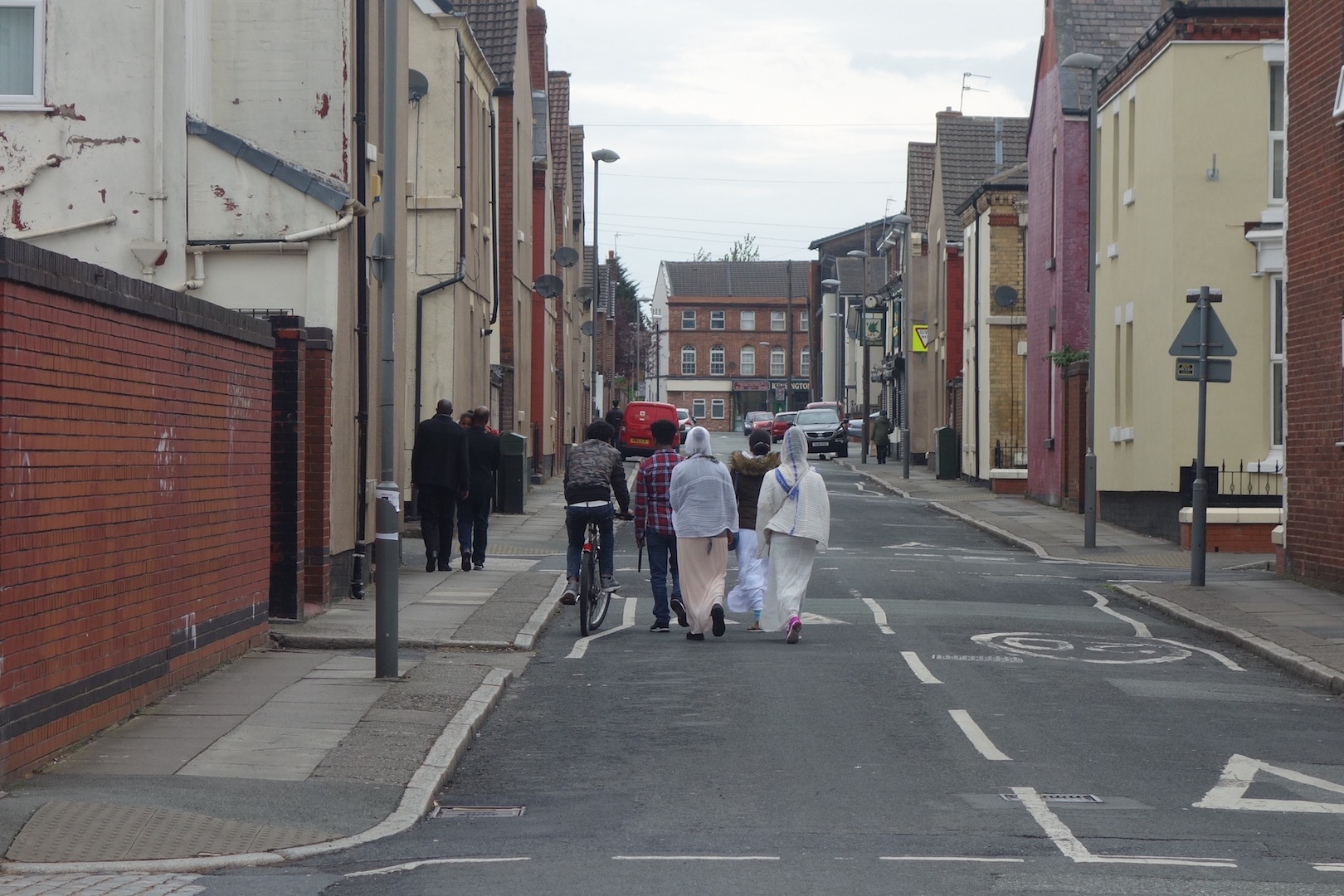
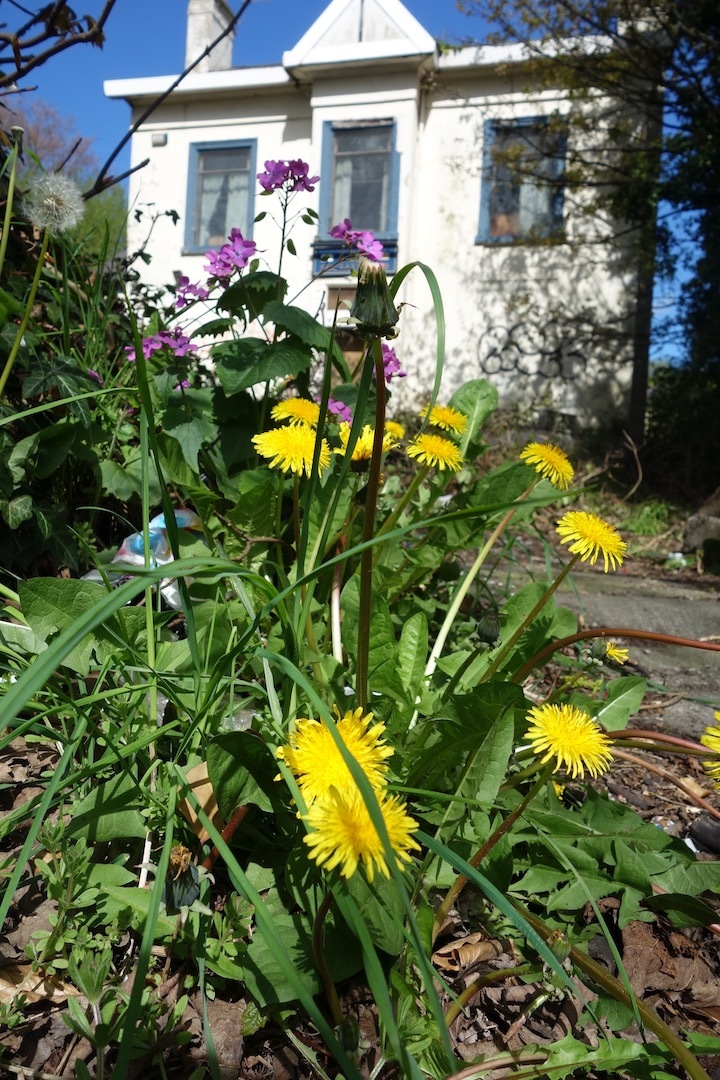
A temporary resident of the district, the student’s diatribe appeared on the Liverpool website of university news network The Tab, before quickly being dropped again. Her point, essentially, was that Kensington is a dump, and a dangerous dump at that; too hazardous to be safely negotiated post 7pm.
Meanwhile, a local newspaper journalist claimed unhappy residents told him there were gangs of drug dealers “on every corner”. He reported on Kensington’s “everyday reality” of “violent crime, filthy streets, drug dealing and prostitution”. He says one local declared, “the community is gone”.
A picture of some furniture in an alleyway accompanies the article, ignoring the umpteen neat streets of well-kept terraced homes. Nor does the piece mention that for every failure by those agencies charged with improving Kensington, there are glimmers of light.
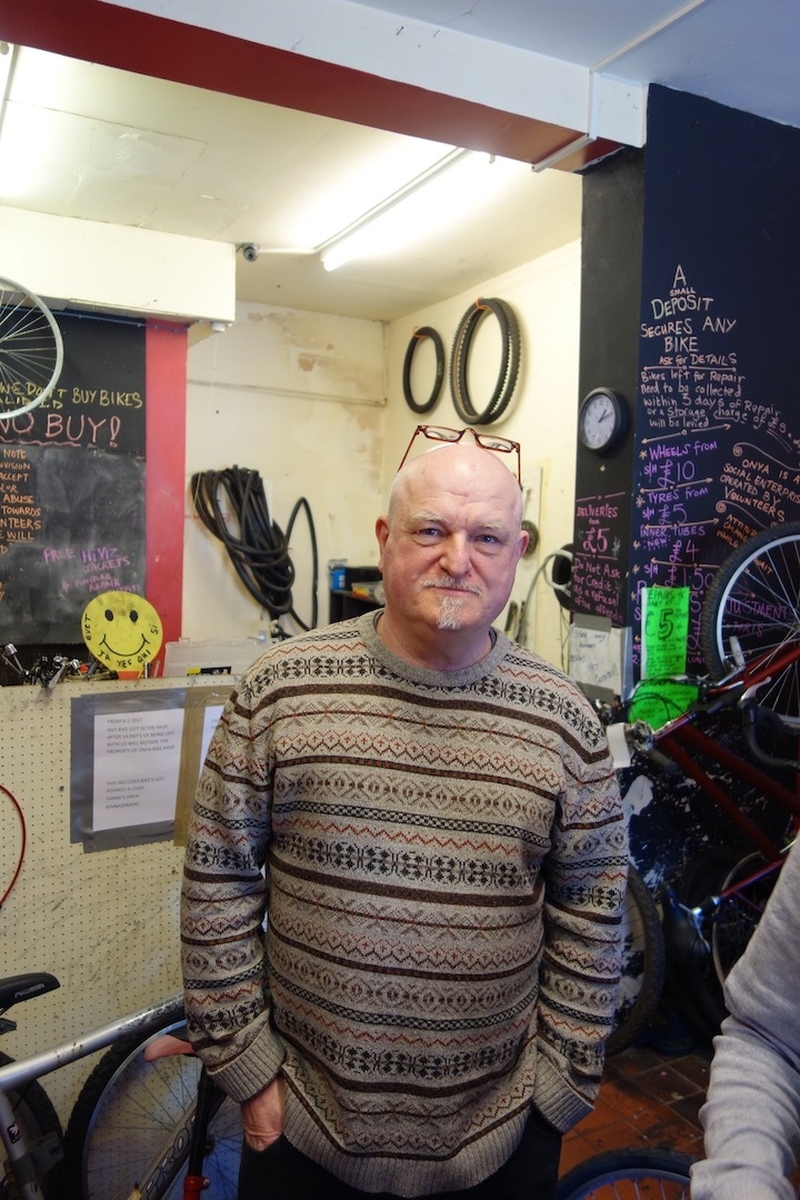
Like the locals who give up their time to teach older residents to navigate the internet. The refugee who fixes the toilet at a local community hub without being asked. And the ex-Cammell Laird worker who enlisted an army of volunteers to refurbish a park bandstand using paint begged from his former employers.
What it doesn’t say, in other words, is that Kensington, for all the stark statistics of economic deprivation, unemployment and crime, is much like anywhere else. Look for the negative, and you will find it.
It doesn’t help that Kensington suffers constant comparison to its London namesake, which just happens to be one of the UK’s wealthiest neighbourhoods.
Yes there are problems, says Faragher. Prostitution has become an issue on one road, the result of gentrification in other areas moving the problem along. Too many shops spend most of the time with the shutters down, their dubious real purpose going undetected, he says, by a city council not enforcing the rules.
If people are unhappy, he insists, that’s partly because they feel they have been let down, time and again. A case in point being Jubilee Park, opened in 2010, accompanied by much razzmatazz, by Olympic gymnast Beth Tweddle.

Kensington Regeneration, a quango tasked with transforming the area’s fortunes in the first 10 years of the millennium, provided £900,000 to create the park, pledging to ensure it became “a pleasant place for all the community”.
Among promised facilities were a cycle track, sensory garden, bowling green and wildlife meadow. Seven years on, the sensory garden is long neglected, overgrown with nettles, and the nearest thing to a wildflower meadow is a blanket of dandelions gone to seed.
The cycle track never materialised. Signs point to a bowling green that does not exist, nor ever has. There is more, and it would be funny if you didn’t feel the people of Kensington had been badly short-changed.
“Kensington,” says Faragher, “has been a bit like one of those whales you see beached. The sharks move in, reduce it to a skeleton, then they all fuck off again.”

It wasn’t always thus. Thought to have been named after its London counterpart, but with no irony back then, the Kensington of 150 years ago was home to merchants as the city’s economic wealth peaked.
They used their money to build elegant villas and impressive municipal buildings. With the growth of the port and industry, new housing was needed for an influx of workers and as they moved in, the merchants moved out.
Kensington of the 1950s and 1960s was typical of many working-class districts: it was no picnic (one former resident recalls her grandmother raising 11 children in a two-up two-down in Farnworth Street) but people lived with a dignity allowed by jobs, lots of small, thriving shops and a strong sense of community.
These were the years that spawned film director Terence Davies, the acting brothers McGann and musician Michael Head who was forming the Pale Fountains as Davies was setting off on the road to becoming Britain’s greatest living director.
The nadir came in the 1980s with Thatcherism, de-industrialisation and drugs, the latter encapsulated in Head’s rousing anti-anthem to his heroin habit, Streets of Kenny.
Much remains of the district’s prosperous roots; around every corner you are greeted with grandeur – the impressive domed library; the Victorian lamps and vertiginous trees of Elm Vale; Newsham Park, whose glorious expanse rivals anything in that other Kensington.
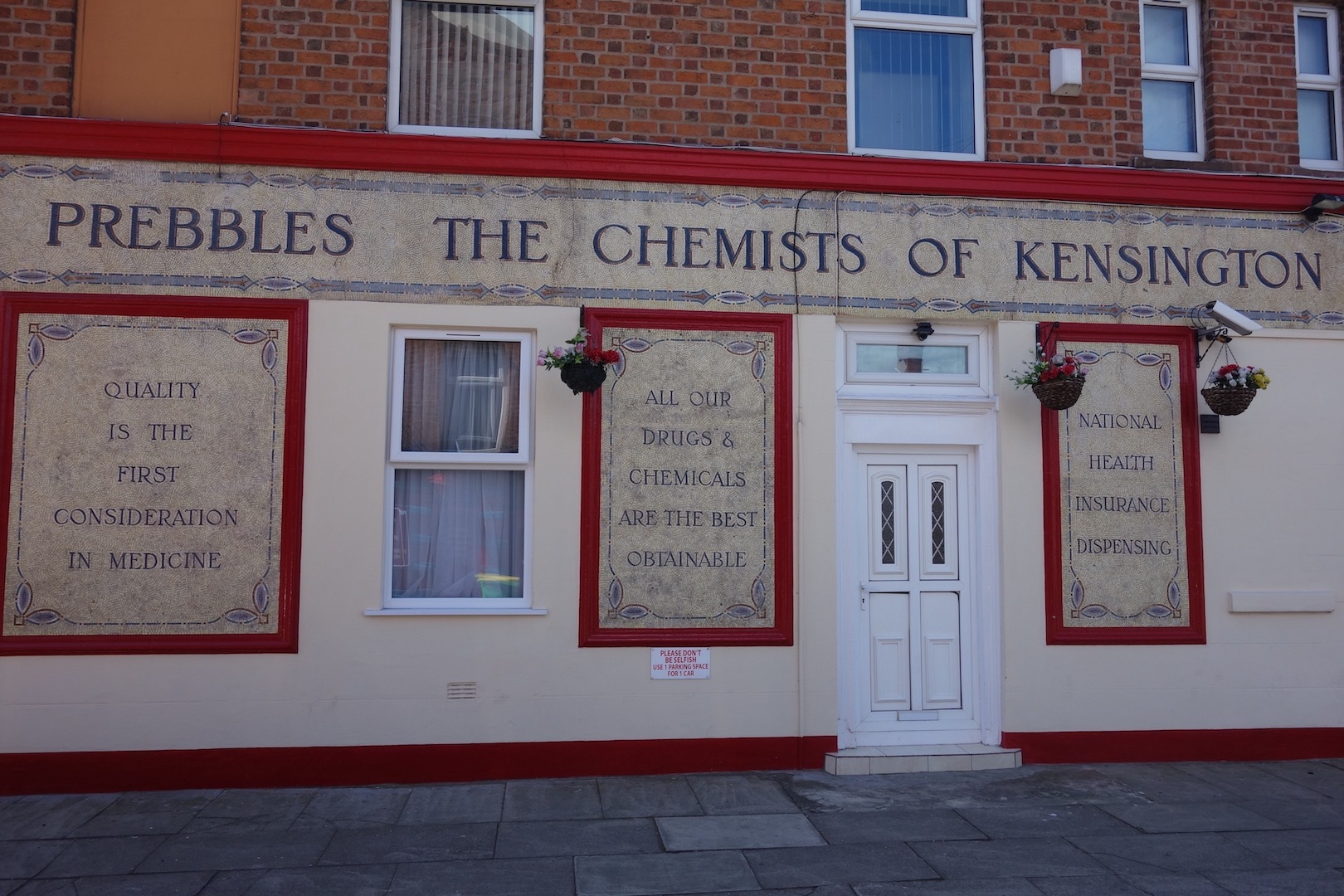
Dominating a wall in an otherwise unremarkable street, the intricate mosaic tiling of an ostentatious sign for a shop long gone, “Prebbles the Chemist of Kensington”. As I admire the craftsmanship, a man steps from the pub opposite. “Great that, isn’t it lad?” he says.
That pub, The Kensington, with its polished blue tiles and decorative detail, is one of the best examples of the several traditional pubs still eking out a livelihood in these parts.
A diverse population has mostly been a positive for the area and here’s an example: in the late 1990s/early 2000s academic achievement by schoolchildren in the area rose 25 percent in direct proportion to an increase in the immigrant population.
The usefully entitled Polish Food store reflects the more recent arrival of eastern Europeans. Up the road, the L7 Village Market stocks a world of produce, from Mexican salad in a tin to a tube of mini poppadums.
A sizeable student population has attached itself to Kensington and Fairfield, attracted by the proximity of the city centre and its relative cheapness, with restaurants and cafes turning out food that’s anywhere between satisfactory and stupendous, and all for a song.
Kensington is about to get the best thing since sliced breadFew neighbourhoods can match the close-knittedness of the 1950s, the world has changed too much. But the claim that “the community is gone” in Kensington does not stack up against a body of evidence to the contrary.
Kensington Vision, a community interest company headed by Faragher, occupies six out of seven buildings on a block in Holt Road, loaned to them or rented at a reduced rate by the landlords, local boys made good, who were raised in one of the properties and still hold an emotional investment in the area.
Out of those buildings operate a bicycle recycling scheme, free classes in radio production, computing, blogging, ESOL, bread making, and chocolatier skills, and Liverpool Community Radio, which this week celebrates its 10th birthday on the same day as, three doors down, a new bakery begins selling high quality hand-made bread with heavily subsidised prices for locals.
Willing volunteers help to run all of these ventures. When classes are taking place in the back room of the cafe, customers are respectfully requested to keep it down a bit.
Look for the positive and you will find it. A dog show on Easter Monday - Kenny Krufts - attracted 300 people; a screening of Monty Python’s Life of Brian at the revamped bandstand drew a sizeable audience, bringing their own chairs, blankets and popcorn.
No single mood or outlook dominates, everyone has their own story to tell. But Faragher believes a community spirit still bubbles under. “It just needs enlivening.”
It needs little enlivening in the Croissant, which, apart from a warm and informal meeting place, provides valuable work experience for people with issues ranging from mental health to addiction.
In walks the refugee and part-time unpaid plumber. Iranian, he announces he has just been granted leave to remain. Handshakes all round.
Owen the baker is another outsider who has embraced Kensington. “I have never,” he says, “felt anything but at home here.”
Front of house at the Croissant is Wendy, 30 years a Kensington resident. Does she think it’s a dangerous place to live?
She is aghast. “I go out on my own with my dog after dark all the time and I have always felt safe. It’s a lovely place.”
What's the score? Gerry Corner casts a critical eye on five eating places in Kenny
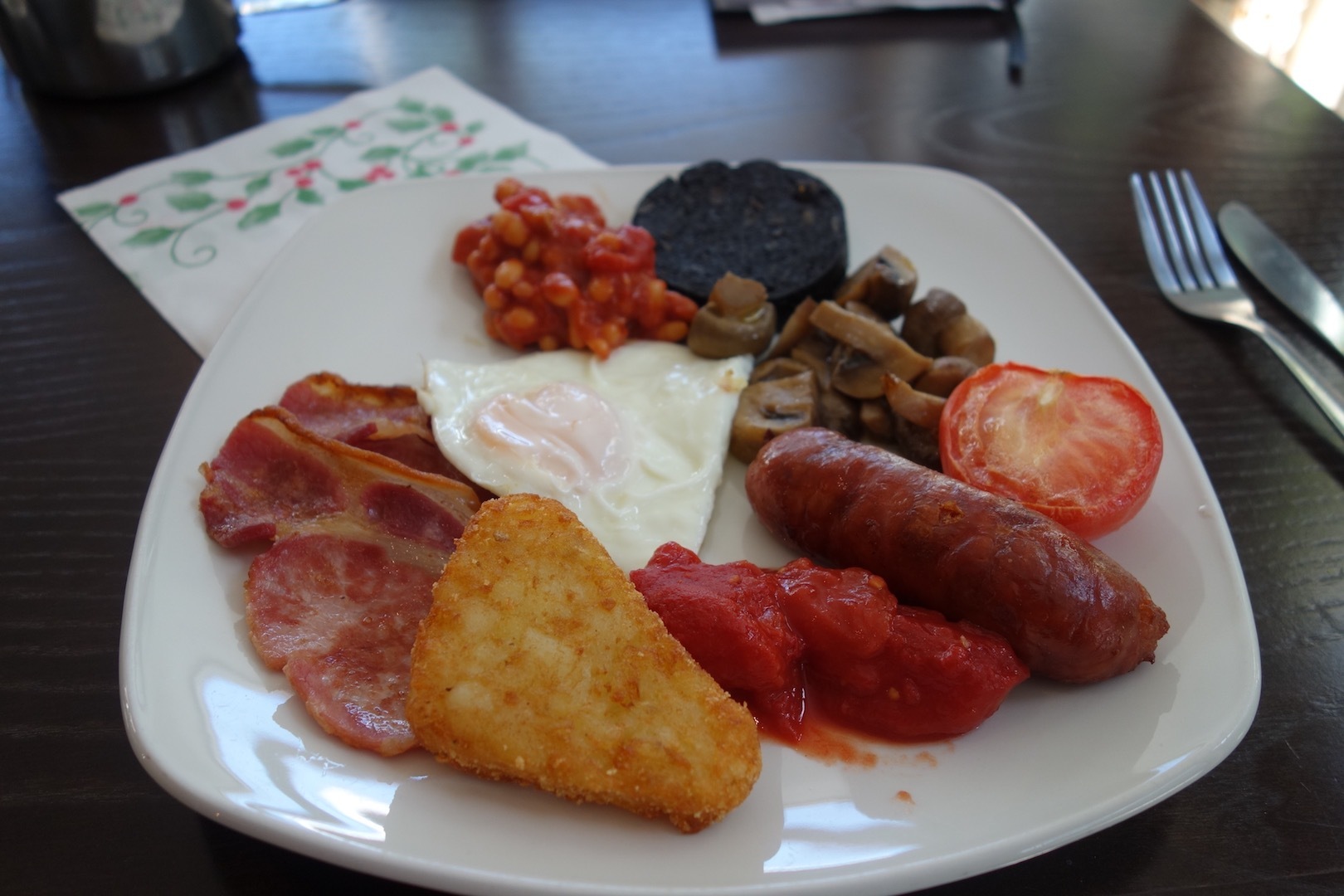
Arthur’s at the Beech Mount Hotel
THE former grandeur rather paled, a sense of a by-gone era suffuses Arthur’s, from the ornate mirrors and chandeliers, to the courteous welcome from the man taking my money at reception, to the charming Italian waiter Maurizio.
On the music system, Tracy Chapman sang incongruously about revolution but she would find no recruits here.
Pay £6 up front for all you can eat from the breakfast buffet bar: bacon, eggs, tomatoes from a tin, hash browns from a bag, sausage, black pudding, beans and mushrooms.
Some of it had clearly been sitting awhile but had not suffered unduly. Maurizio, however, insisted on the eggs being freshly fried.
“Half decent”, was how it had been described to me, and it was at least that (6/10), solid fuel for a busy day ahead.
A generous Sunday carvery comes at £8.95 for adults, £3.95 children.
*****
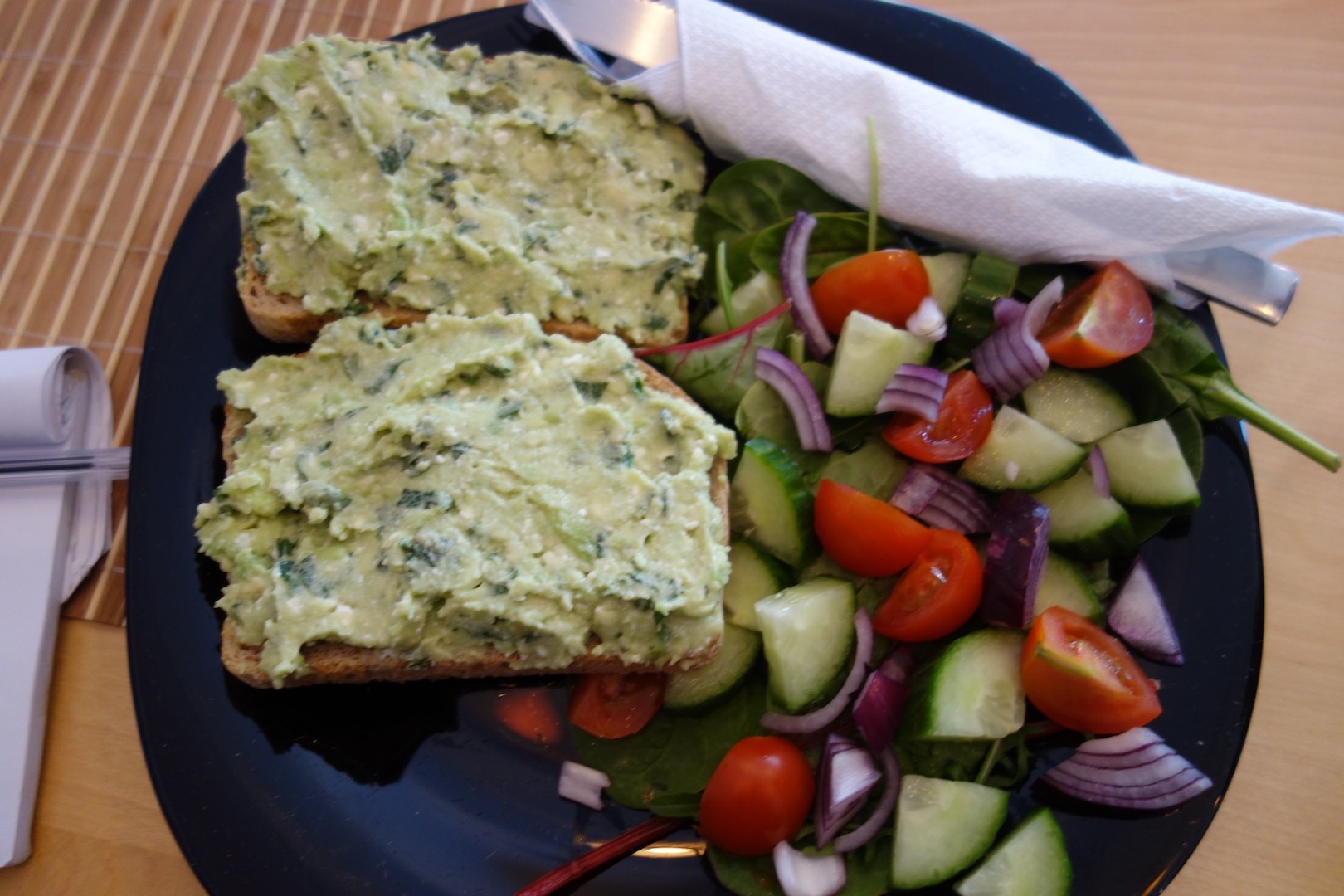
Croissant of Inequalty
INFORMAL, idiosyncratic, half cafe, half meeting space, the Croissant provides a warm welcome, tasty vegetarian food and a killer cup of coffee. No croissants, but they’re coming.
There are daily specials but regulars include top notch pitta bread fresh from the bakery three doors down, filled with feta, spinach and tomato (£2.50, 8/10); smashed avocado, mint and feta on sourdough toast (£3, 7.5/10), both served with salad (help yourself to the balsamic dressing); and soft creamy hummous, finished with a dash olive oil and a sprinkle of paprika, and served with more of that pitta (£2, 7/10).
Joe Black’s aptly-named Rocket Fuel coffee is full-bodied, no hint of bitterness, kicks like a black belt and, at £1, has to be the best value in Liverpool (9/10).
You can also have a “posh milky one”, which they would probably call a latte in Costa, for £1.50.
Monday - Friday, 11-3 only. 53-57 Holt Rd, Liverpool L7 2PN. Tel. 07761 483370.
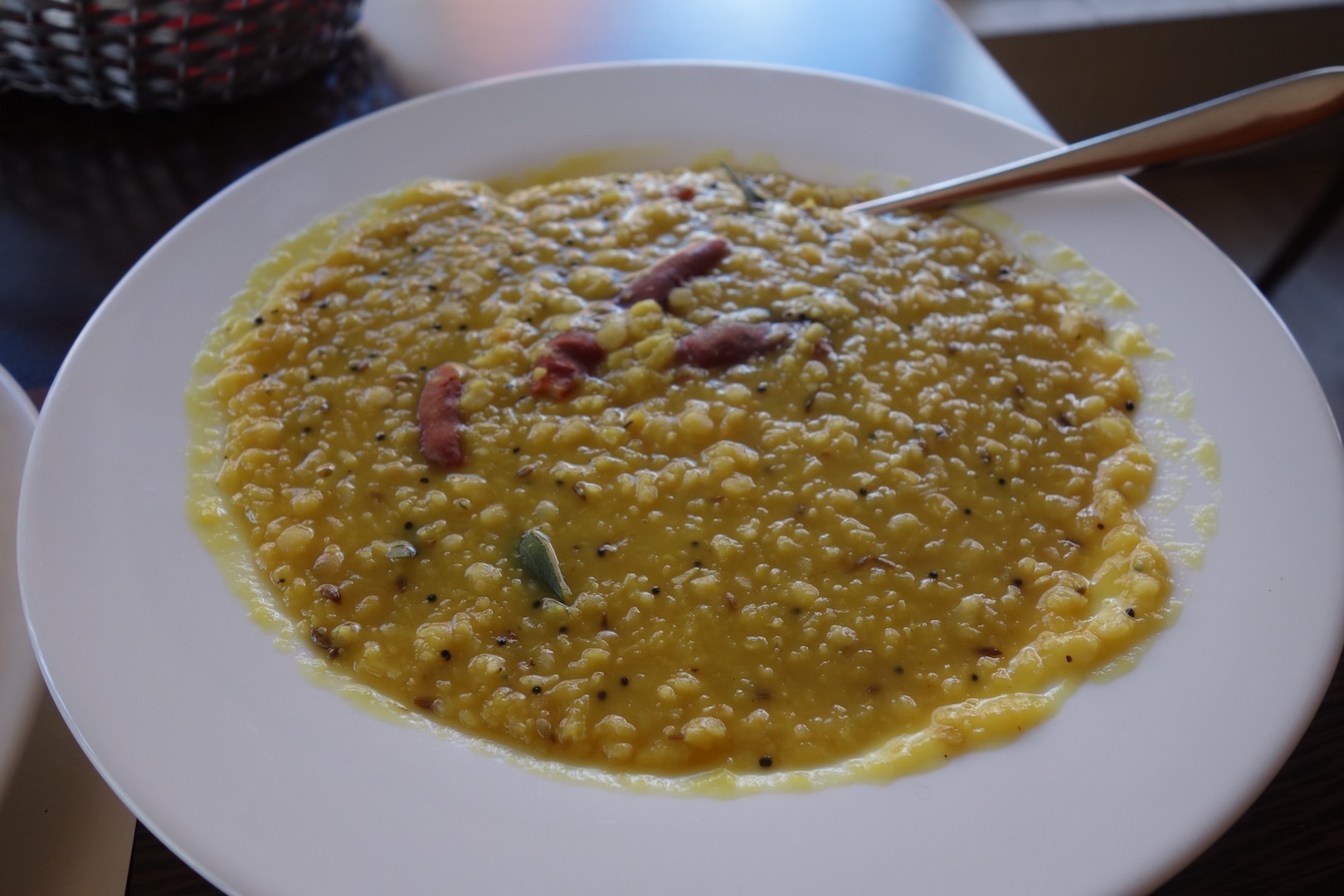
Akshaya
SRI Lankan and south Indian cuisine in a bright, modern space, with a couple of nods to the old country/countries.
Mutton rolls, are actually lamb two crisp, crumb-coated deep fried rolled pancakes filled with soft tender meat, lamb or mutton, the menu says one then the other (£1.95, 6/10)
A Sri Lankan style dhal flavoured with coconut and spices, (£3.95, 6/10).
290A Kensington, Liverpool L7 2RN. Tel. 0151 261 0001.
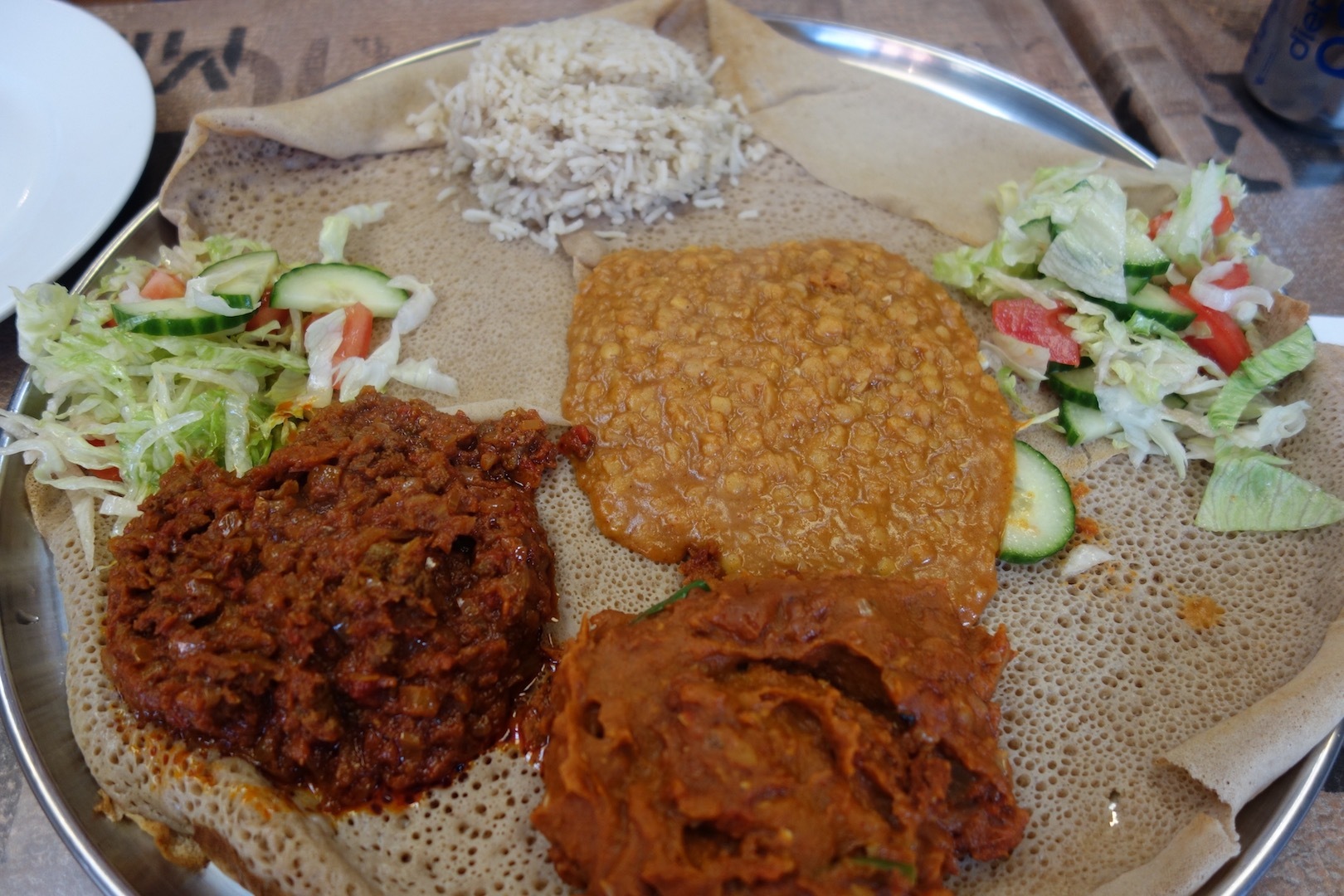
Qohaito Cafe
A SMALL, deeply hospitable cafe serving the food of Ethiopia and Eritrea.
Due to a small misunderstanding largely of my making (their level of English is still rudimentary, but beats my Eritrean) I am not a hundred per cent sure if what I ordered is what I got, but I can say this: it was bloody great.
A huge platter arrived with three types of stew, including tiny tender chunks of lamb in a ruby red, tomato-rich sauce, hot as a summer’s day in Massawa (if this is ??, as I believe, there is a mild version available); and an Eritrean variety of dhal, which hands down beats any I have had; a fresh, sprightly, lightly dressed salad and a mound of perfect rice.
It all comes loaded on to injera, a spongy flatbread that resembles a sort of giant, dense pancake, and doubles as an eating utensil in Eritrean hands. Tear off a piece, scoop up some food, eat. Or just use the knife and fork supplied.
The lot came to a fiver, I’m not sure how, but it probably had something to do with my charisma. You should expect to pay more, but not much more; the most expensive dishes on the menu are £7.
They even threw in a cup of Eritrean coffee, dark and strong, on the house (tip: don’t drink it too late or you’ll be awake until daybreak).
Some of these people have fled from bad situations and deserve a break. Spend some of your money there and I doubt you’ll regret it.
Food: 8.5/10
70 Prescot Rd, Liverpool L7 0JA. Tel. 07808 291916.
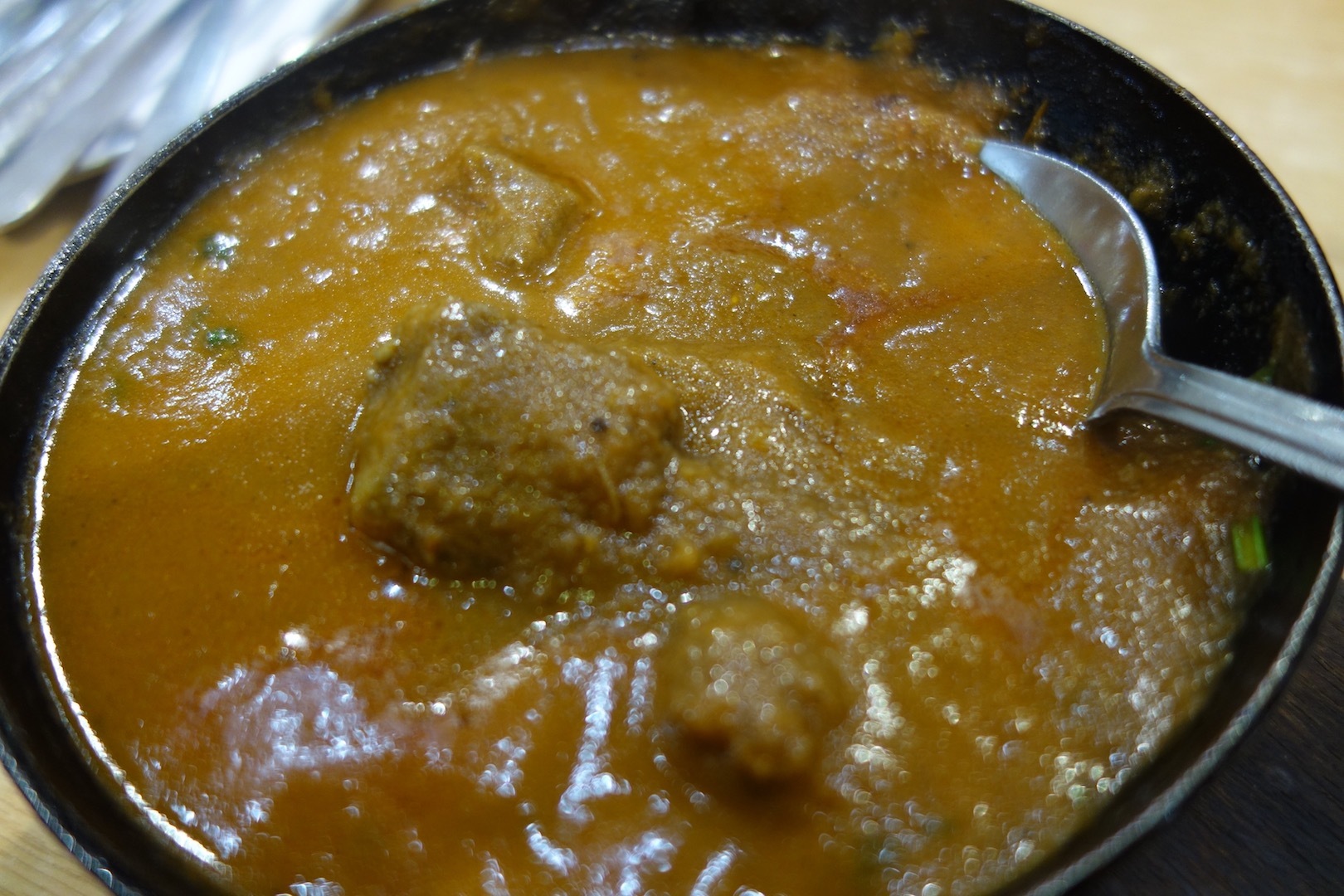
Jimmy’s Grill
STAFF at Jimmy’s don’t look like the sort to sell their granny. But they do sell their naans for 50p – which is practically giving them away.
Jimmy’s looks barely distinguishable from any high street fast food joint but their culinary output, much of it inspired by the sub-continent, is prized by the local populace and rarely disappoints.
Made on the spot, the naans (9/10) are warm and soft and we mop them in lamb madras (£6, 6/10) not the hottest but with big, decent quality chunks of meat, and chana masala (£4.50, 7.5/10), tender chickpeas in a richly satisfying, gently spiced sea of golden brown sauce. Both come with a shiny salad, with crisp, fresh iceberg and yellow chillies, the size of your index finger.
121 Prescot Road, Fairfield, L7 OLB. Tel. 0151 260 6122.




